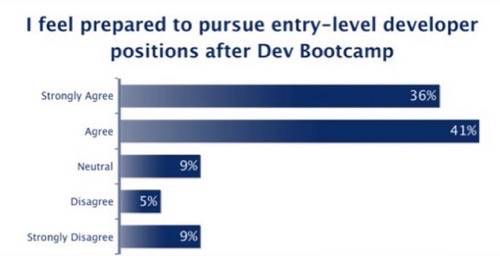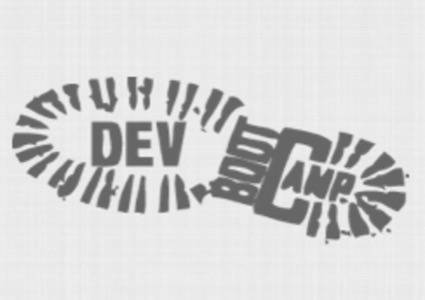Learning to code is becoming the key skill for anyone who wants to launch a tech startup, or even just get a job working at a hot tech company. That may seem intimidating, but programming is not some monumental skill that only specially gifted people can learn. Really, it it isn’t all that different from learning to speak another language. If you can pick up the rudiments of Spanish or French in a couple of weeks, how hard could it be to get started with Ruby On Rails? The Developer Bootcamp is designed to help anyone get started coding – and they might even get a job at a startup or tech heavyweight out of it as well.


A Vocational School for Programmers
San Francisco-based Developer Boot Camp was an idea that started with a friend in need. Last November, a friend of Shereef Bishay was stuck in a dead end job as an administrator. He wanted to help, so he suggested his friend learn to code.
“He lost a bet to me and owed me some money and I told him, ‘hey, go teach yourself Ruby On Rails. You are a developer and you don’t know it,’” Bishay said.
That led to a post on Hacker News offering to teach people how to develop in Ruby. Bishay would charge tuition but would refund it if the students got jobs as developers and he earned a recruitment fee from the hiring company.
So began Developer Boot Camp.
The initial class, taught mostly by Bishay and a group of volunteers, produced 21 students, 15 of whom got job offers (with an average starting salary of $79,000) as developers at the end of the program. Bishay now has a full summer class of 40 students and is taking applications for the fall. The program lasts 10 weeks and has tuition of $12,000.
Wait. $12,000? To learn Ruby in a relatively short program with no official certification? That seems steep, especially with programs like Codecademy available for free online and other programs like Boston Startup School free for students that are accepted.
Bishay said that the ability to get a job and become a developer is worth the expense. For the next two sessions, if students get a job and Bishay gets a recruitment fee, he will refund $5,000 of the tuition. If students don’t get a job or there is no recruitment fee for the job they do get, Bishay keeps all of the tuition.
“Right now it is a huge opportunity and it is going to be for the next decade. That is why I can afford to be so cheap… If 90% of my graduates are getting job, it means that tuition, it is nothing, right? Compare it to college. This is why people go to college, so they can get jobs. Then they leave $150,000 in debt and they don’t get a job,” Bishsay said.
Pay $12,000 to skip college and go straight to being a developer? If it gets you a job, it is justified. Right?
Perhaps. At the end of the Developer Bootcamp’s spring class, its “career day” attracted 30 companies to interview the 20 students. That’s a good ratio.
The initial class included one teenager, 10 people in their 20s, seven people in their 30s and two in their 40s (one person dropped out). The question is whether it is more effective to spend the money to gain entry-level employment as a Ruby developer where you can learn other software development skills on the job – or to go for an academic degree that may or may not set the student up for a lifetime of success. And vocational schools in other fields – for example, learning how to be a chef – often cost a lot more than $12,000.
This is not the first time a Silicon Valley entrepreneur has advocated learning to code as opposed to going to college. A year ago, PayPal co-founder and serial entrepreneur Peter Thiel created the “Thiel Foundation” to give $100,000 to 20 people under the age of 20 to start their own companies. There is also Chicago-based Code Academy (not to be confused with Codecademy, the free online program to learn the rudiments of coding) that teaches both coding skills and entrepreneurship in a three-month program.

Teaching People how to be Programmers
From a high-level perspective, Bishay just wants to teach people how to program. “I appreciate that the tech companies are hiring and there is a need, but that is not what inspires me. That just helps make it a business,” Bishay said.

“What it was born from was I love my friend and I thought he should be a developer and I love my life as a developer. It is an awesome thing to be and I think everybody should learn to code, it is the new literacy,” Bishay said. He likens software programming to reading and writing 300 years ago, when only a few people could do it. He predicts that those that do not know how to code will soon be in the same position as peasants who could not read or write. “Software is eating the whole world and in 10 or 20 years, if you don’t know how to program it [will be] like 50 years ago not knowing how to read and write. People need to do this,” Bishay said.
Bishay also wants to dispel the myth that software engineers are some type of super people. “I think there is a myth that has been perpetuated. The myth goes something like this: Only a fraction of humanity was born with the genetic makeup to become developers. This is hard, complicated stuff and is not for the faint of heart and you need to be a special, special person to do it. People do not think that they will become programmers. It is something that other people do that are more special than them,” Bishay said.
As Codecademy proves, anybody can learn to be a programmer. It does not take an IQ of 170 to learn Ruby On Rails. As for whether shelling out $12,000 for a 10-week programming program is a good idea, that probably depends on an individual’s situation and their perspective on life and employment. And it could be a good way for entrepreneurs to learn enough coding skills to satisfy investors and evaluate programming talent. It certainly is not for everybody.
Top image courtesy of Shutterstock










